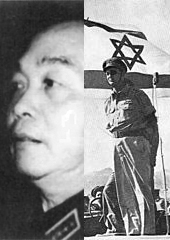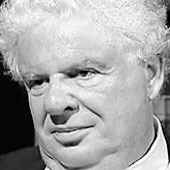Israel’s Rommel and Vietnam’s Napoleon
What can the lives and victories of top generals of Israel and Vietnam teach the U.S. Army?
October 13, 2013

The extraordinary lives and military victories of Vo Nguyen Giap in Vietnam and of Moshe Dayan in Israel provide a devastating rebuff of the “bigger is always better” conventional wisdom of the U.S. Army.
The death of Vo Nguyen Giap in Hanoi on October 4, 2013 should cause all Americans to reflect on their country’s military effectiveness – and abandon the obsession with pure military prowess. Such prowess says nothing about how well the vast resources made available to the U.S. military are used.
The Republicans, in particular, should think about this hard. After all, in all areas of government spending other than the military, they like to portray themselves as the bang-for-buck crowd.
Giap is rightly remembered as one of the greatest and most successful guerrilla commanders in history. The United States got the full flavor of his talents when it was defeated by North Vietnam in the Vietnam War and eventually had to withdraw.
General Vo Nguyen Giap died peacefully in a military hospital in Hanoi at age 102. No other great captain of history has lived to such an age.
It was an incongruously aged and peaceful departure from such a life filled with violence, killing, revenge and rage. To Americans’ considerable relief, his extraordinarily long life covered a far vaster spectrum than only being instrumental in defeating them.
From 1944 to 1979, over a 35-year period, General Giap won full-scale wars against Imperial Japan, France, the United States, South Vietnam, Cambodia and China. He won three long classic guerrilla insurgency wars, three major land battles against France and a coordinated classic armored war campaign against South Vietnam.
Then there was the rapid conquest of Cambodia (where his forces ended a genocide that the United States and China had ignored) and a defensive campaign against China’s People’s Liberation Army. In that campaign, at the odds of five to one in terms of troop size, his forces inflicted 250% more casualties on their enemies than they suffered.
He reached his apogee as a military leader only during his 60s, uniquely old in the annals of military history. Beyond tackling the United States and South Vietnam, he also led Vietnam’s forces to victory against Cambodia and China – all within a single decade.
A soul mate from Israel
Giap’s years of leadership and triumph eerily paralleled those of another legendary military man, General Moshe Dayan of Israel. He led the forces of an even smaller country to unexpected and apparently miraculous victories in one war after another.
Born in 1915, Dayan was six years younger than Giap, but started his active military career at almost the same time in 1939. They were both jailed early by colonial authorities who found them a threat – the British in Palestine and the French in Vietnam.
Neither planned to be a soldier. Giap studied law, not war, and took a degree in it from the University of Hanoi back in the 1930s. He was a teacher and an outstanding journalist. He launched several journals and newspapers while still in his 20s. He privately became a talented poet. He wanted to be a historian, but history itself got in the way – and he spent 40 years making it instead.
Dayan was raised on a pioneering farm (but not a kibbutz) in the Jezreel Valley, or Emek of northern Israel. He fought to defend his community against terrorist attacks in the late 1930s. After being jailed, he curiously enough found himself fighting against Giap’s sworn enemies, the colonial French, while serving with British forces in Syria in 1941. In June 1941, he lost an eye to shrapnel from a French rifle bullet and wore a signature eye patch the rest of his days.
The French military’s big footprint
Giap’s father, sister and sister-in-law were tortured and executed by French colonial authorities in Hanoi at the same time. His wife, a hauntingly beautiful young woman called Nguyễn Thị Quang Thái, the mother of his daughter Hong Anh (Red Queen of Flowers), was tortured and reportedly driven to commit suicide in her dungeon by choking on her own belt. However, a later investigation by U.S. intelligence analysts concluded that she was hung up in her cell and beaten to death.
Giap did not learn any of this until he returned from exile in 1944. He had written love poetry to her, believing she was still alive. His wife died in the Hao Lo, or Oven, prison. That is the same complex that held American airmen during the Vietnam War and that became known as the “Hanoi Hilton.”
Giap first made his mark during the last year of World War II, when he played a leading role in organizing resistance to Japanese occupation forces. His troops earned an outstanding record of rescuing downed American airmen and transporting them to safety. Then, from 1946 to 1954, he led his impoverished Viet Minh forces to victory against France.
Giap’s troops were so poor they didn’t even have shoes, so they improvised sandals from the rubber of auto tires. They rapidly seized major rural regions from the Red River in the north down to the Mekong Delta and set up a provisional government with Giap as Minister of the Interior.
Eventually, Giap and his forces trapped a French force at an advanced base in Dien Bien Phu and succeeded in bringing up heavy artillery through the jungle to systematically destroy their defenses in 1954.
The man who invented Israeli-style warmaking
Dayan was a successful combat commander in Israel’s 1948 War of Independence. In 1953, he became Chief of Staff, or Ramat-Kal of the Israel Defense Force. Dayan transformed it into the tough, informal, flexible and uniquely victorious blitzkrieg force that made it world famous. In 1956, Dayan and his IDF swept numerically far vaster Egyptian forces from the Sinai Peninsula.
In 1967, as Giap’s war with the United States approached its climax in Vietnam, Dayan was recalled from political exile by popular demand. The immediate cause was Egyptian President Gamal Nasser’s move into the Sinai again with an army of 100,000 and his pledge to annihilate the State of Israel.
Dayan struck preemptively first and destroyed hostile armies and air forces on every side. The war was effectively won within its first six hours of air operations. It was all over in only six days.
Asymmetric warfare, Vietnamese-style
“No other wars for national liberation were as fierce or caused as many losses as this war,” Giap recalled in a late interview with The Associated Press in 2005. “But we still fought because for Vietnam, nothing is more precious than independence and freedom.”
In a revealing comment, Giap told the AP, “We had to use the small against the big. Backward weapons to defeat modern weapons. At the end, it was the human factor that determined the victory.”
Israel’s Dayan would have agreed. In his writings, he uses the Biblical hero David as the model for adopting modern tactics that allow a small, elite force like the IDF to defeat far larger and better-equipped armies.
Giap enjoys the rare honor among military leaders of having ended a genocide. In 1978, the Vietnamese Army occupied Cambodia and ended the maniacal mass slaughter by Pol Pot and his Khmer Rouge (“Red Cambodia”) forces that killed three million of the country’s seven million people.
Dayan led the military forces of the infant Jewish state less than a decade after the Jewish people had suffered the most notorious genocide in history, the industrialized slaughter of six million Jews by Hitler’s Nazis and their allies. He arguably prevented a second Holocaust of millions by saving the state of Israel from extermination in 1967.
In 1973, still defense minister, Dayan was part of an Israeli government led by Golda Meir that was taken by surprise when the Egyptian and Syrian armies attacked it on the Jewish holy day of Yom Kippur. But they fought back and totally defeated their enemies again on both fronts.
Great generals don’t attend war colleges
Neither man ever formally studied war. Both learned most from their nation’s foremost enemies. Dayan’s great victories were fought using the frontline leadership, armored tank or panzer blitzkrieg tactics and radio communications command and control of World War II Germany’s greatest generals Heinz Guderian and Erwin Rommel.
Giap used the campaigns of France’s greatest general Napoleon Bonaparte and the military axioms of China’s Sun Tzu to get his mojo for military superiority. He defeated the armies of both nations.
Ever the learned man and interested in making his country whole at long last, Giap became an enthusiastic supporter of economic liberalization in Vietnam. He also advocated warm relations with the United States and even took up environmental causes. His poetry was always filled with a passionate appreciation of the beauties of nature.
Dayan died much earlier than his Vietnamese counterpart. In the years before his death in 1981, he was a primary architect of the Israel-Arab peace process, serving as Israel’s foreign minister from 1977 to 1979. He played a crucial role in brokering the 1979 Israel-Egypt peace treaty and established the guidelines and policy initiatives that led to the Oslo Peace Process, which started 12 years after his death from cancer in 1981.
Relying on the “balance of fervor”
Writing in 1994, Giap’s biographer Cecil B. Currey recalled hearing the general recite his own poetry on a trip they took together in 1980. Currey said Giap recalled the long, terrible wars for independence with the lines,
Talents were like leaves in the autumn, and heroes appeared like the dawn.
“Literature,” Currey reported Giap as saying, “can and must elevate a man’s soul.”
Dayan would have agreed. He wrote an acclaimed autobiography and a series of other books. His popular work on Biblical archaeology, “Living with the Bible,” remains a classic of its kind.
Giap’s broader legacy to Asia and the wider world was that size, strength and number of troops were not the decisive factors in waging war. Charles W. Freeman, Jr. co-chair of the U.S. China Policy Foundation and a leading U.S. expert on Asian affairs, said, “A little country can beat a big one, if the balance of fervor is with it. General Giap was the little guy who drove this point home to all concerned.”
Dayan taught exactly the same lesson in his parallel military career in Israel. For all the war and violence in their lives, both men ultimately shared and expressed the same humanitarian values.
Takeaways
The victories of Vietnam’s Vo Nguyen Giap and Israel’s Moshe Dayan rebuff the “bigger is always better” belief
A little country can beat a big one, if the “balance of fervor” is with it. (Charles W. Freeman, Jr.)
Americans should reflect on US military effectiveness – and abandon the obsession with pure military prowess.
Dayan struck preemptively first. The 1967 war was effectively won within its first six hours of air operations.
Giap said, “We had to use the small against the big. It was the human factor that determined the victory.”
Giap enjoys the rare honor of having ended a genocide. Dayan arguably prevented a second Holocaust in 1967.
For all the war and violence, Giap and Dayan shared and expressed the same humanitarian values.
Giap studied law, not war, at the University of Hanoi in the 1930s. He was a teacher and a journalist.
Dayan was an architect of the Israel-Arab peace process, serving as Israel’s foreign minister from 1977 to 1979.
Read previous

Humanity at a Crossroads
October 12, 2013
